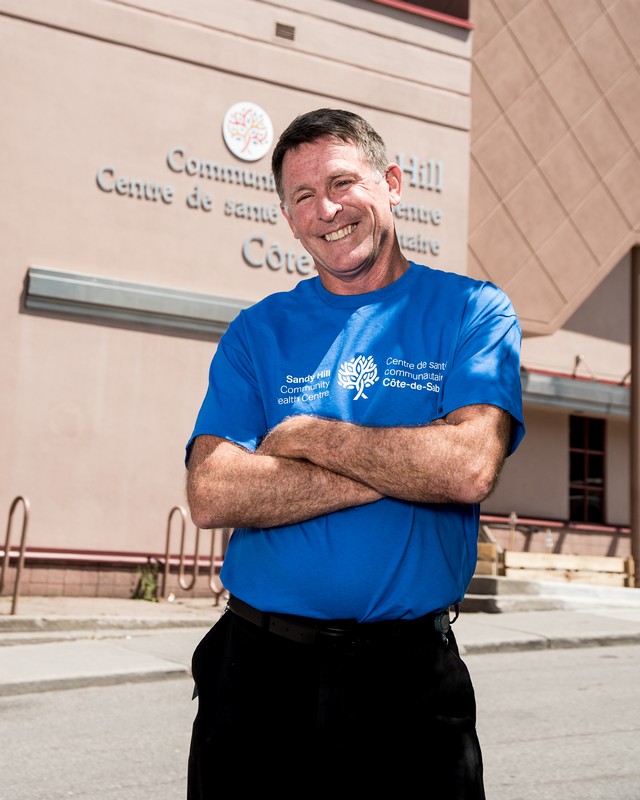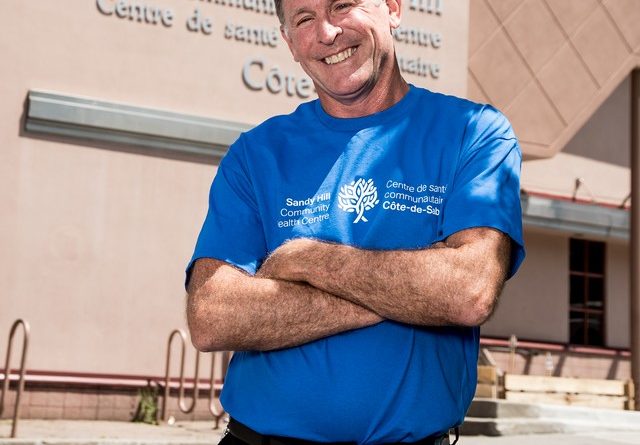End of an era for the Sandy Hill Community Health Centre
Christine Aubry
It’s the end of an era for the Sandy Hill Community Health Centre at the intersection of Rideau and Nelson. After 20 years of service, Executive Director David Gibson will be retiring in August.
Gibson has led the organization through immense growth and unprecedented challenges. It was my privilege to listen to his reflections on the last two decades and his hopes for the future of the organization.
Gibson was drawn to SHCHC in 2003 because of its history and exemplary leadership in providing cutting-edge, diverse, quality-based health services to those who faced the greatest barriers to good health — a hallmark tradition, he says, that has not changed.
SHCHC is also unique in that all services are offered in both official languages. Gibson said one of his proudest moments was when the Centre finally received its official bilingual designation from the Province in 2006. Currently, 85% of the staff are bilingual.
A quarter of the Executive Director’s time is spent working with the Centre’s volunteer Board of Directors (which has included many residents of Sandy Hill over the years), and that has also clearly been a highlight for Gibson. “It has been amazing to watch this very diverse group of people come together to make interesting, informed decisions about the future of the organization,” he said.
One of those major decisions was whether to instruct staff to seek a federal exemption to operate a safe injection site. But from what was likely a highly stressful time, Gibson’s memories are fond: “The Board really listened and gave us the direction to explore the possibilities. It was an amazing process to observe.”
Today, the Centre and its partners face much more difficult and complex challenges, which Gibson stresses are national in scope and not limited to Ottawa or Sandy Hill, including:
- an increasing number of new Canadians, who may not speak either official language, and a greater focus on the need for Indigenous service-delivery;
- an opioid epidemic affecting all classes;
- a severe shortage of affordable housing, increasing homelessness, and the use of shelters that were never meant to be long-term housing solutions.
The Centre was already seeing an increase in mental health and substance-use disorders, and then a pandemic hit. And the funding, of course, is not keeping pace with the increased demand for services. Gibson explained that this perfect storm has resulted in tensions within the community — a phenomenon that is not unique to Sandy Hill, he says.
The pressure on the healthcare system and social services is spilling out onto the streets and into neighbouring communities, creating what Gibson refers to as “a culture clash.” He also speculates that the isolation of the pandemic has diluted community bonds and eroded partnerships.
Gibson hopes that all of us can remember how tragic and impactful the pandemic was on those who relied on our social services (or who had to rely on them for the first time ever), and that all of those involved can demonstrate tolerance and patience and prioritize dialogue. “We all have a part to do. So what can we do together? What are some of the options?” he asked. These are the questions that all of us need to discuss collaboratively. Not just the service providers, but all levels of government, should be involved, including the City, the University of Ottawa (as a key player in the housing situation), and the affected communities.
What hasn’t changed in 20 years is the dedication of all who work and volunteer at the SHCHC. Gibson repeatedly praised the volunteer board and the medical and social service staff and supports — all key to the Centre’s mission of providing quality health services to those who have the greatest barriers to access. “We are more than consumption treatment; we are a whole professional group of over 200 people. Staff through the pandemic showed enormous resiliency,” he said.
Part of that resiliency stems from the fact, as Gibson proudly explains, that the SHCHC has always had a “family-first” culture. “I am a father, partner, grandfather, brother, [and] friend, first and foremost. That’s where I get my energy, my wisdom, my strength, and my resilience.” And now all of those lucky people will be able to enjoy more time with a wonderful man, who has certainly earned his rest.
The Board of Directors of the SHCHC has extended an open invitation to Gibson’s retirement celebration at the Shaw Centre on June 29 from 4:00 p.m.-6:00 p.m., preceding the Centre’s AGM. To attend, you must register at https://www.eventcreate.com/e/dgretirement

Photo Bill Juliette
